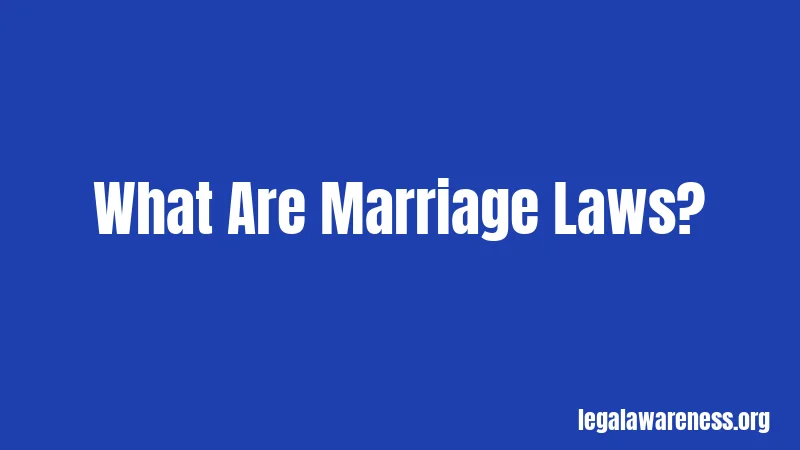Marriage Laws in Washington (2026): Your Complete Guide
Getting married is a big deal. It’s exciting, emotional, and yeah… it comes with paperwork. Washington State has specific rules about who can get married, when, and how. The good news? Most of it’s pretty straightforward once you know what to expect.
If you’re planning a wedding in Washington, you need to understand these laws. They affect everything from getting your marriage license to finalizing your ceremony. Let’s break down exactly what you need to know before you walk down the aisle.
What Are Marriage Laws?

Marriage laws are the legal rules that control who can legally marry, what paperwork is required, and how the process works. Think of them like the rules of a game—everybody has to follow them, no matter what.
These laws exist for a few reasons. They protect both people getting married. They create an official record of your marriage. And they make sure the process is fair and clear for everyone. Honestly, most people don’t think about these rules until they’re actually planning a wedding.
Basic Marriage Requirements in Washington
Who Can Get Married
In Washington, you need to meet some basic requirements to get married legally. Let’s start with the essentials.
You must be at least 18 years old. Period. Washington doesn’t allow anyone under 18 to marry, even with parental consent. This is actually pretty common across the country now. There was a time when younger marriages were permitted, but times have changed.
Both people getting married must be of legal age. Both must be able to give their consent. You can’t be married already—meaning you can’t be in an active marriage to someone else. This is called “bigamy,” and yeah, it’s illegal.
You don’t have to be from Washington to get married there. Visitors and people just passing through can legally marry in the state. That’s one reason so many people travel to Washington for their weddings.
What’s NOT a Requirement
Not sure what counts as a barrier to marriage in Washington? Here’s what doesn’t stop you.
Your gender doesn’t matter. Your sexual orientation doesn’t matter. Same-sex marriage is completely legal and has full rights. Washington recognized marriage equality back in 2012, so this is settled law.
Your religion doesn’t matter. Your race doesn’t matter. Your national origin doesn’t matter. Washington doesn’t ask about any of these things.
You don’t have to be a U.S. citizen. You don’t have to live in Washington. You don’t even have to have a job or money. None of that affects your legal right to marry.
Getting Your Marriage License

Here’s where things get practical. Before you can actually have a wedding ceremony, you need to get a marriage license from Washington. This is the official government document that says you’re allowed to marry.
The process is actually pretty simple. You and your partner go to the county clerk’s office together. Both of you need to bring valid ID. You’ll fill out an application form. Then you pay a fee—around $65, though prices can vary by county.
Washington used to require a waiting period between getting your license and your ceremony. That changed. Now you can get your license and use it the same day if you want. Super convenient, right?
Your marriage license is good for 60 days. That means you have two months to actually have your ceremony. If you wait longer than 60 days, you’ll need to get a new license.
What You Need to Bring
Get this step right the first time. You’ll need your government-issued ID. A driver’s license works. A passport works. A state ID card works. Basically, anything that proves who you are and has your picture on it.
You’ll also need proof of your Social Security number. A Social Security card works best, but you can also bring a tax form or other official document. If you were married before, you might need to show your divorce papers or a death certificate. The county clerk will let you know if they need this.
Both people getting married must be present. Washington doesn’t allow someone to get a license without their partner there. This helps prevent fraud and makes sure both people actually want the marriage.
Marriage Ceremony Requirements
So you have your license. Now you need the actual ceremony. Here’s what Washington requires.
The ceremony needs a licensed officiant. This is someone who’s legally authorized to perform marriages. Usually, this is a judge, a minister, a priest, a rabbi, or another religious leader. Some states let friends perform ceremonies, but Washington doesn’t. You need someone official.
You need at least one witness. Just one. That witness has to be at least 18 years old. They watch the whole ceremony and sign the marriage license afterward. This can be a family member, a friend, literally anyone who meets the age requirement.
The ceremony itself doesn’t have a required format. You can have a huge church wedding. You can have something small in a park. You can write your own vows or use traditional ones. Washington only cares that the right people are there and the paperwork gets signed.
After the ceremony, your officiant sends the signed marriage license to the county clerk. That’s when your marriage becomes official. You’re legally married when that paperwork gets filed, not just when you say your vows.
The Marriage Certificate

Here’s an important detail. Your marriage license and your marriage certificate are different documents.
The license is what you get before the ceremony. It’s permission to marry. The certificate is what you get after. It’s proof that you did marry. You’ll want copies of this certificate for lots of things—changing your name, updating your passport, adding your spouse to health insurance, tons of stuff.
After your ceremony, the county clerk creates your marriage certificate. You can order copies anytime. They cost around $5 to $20 per copy. Most people order several extra copies. Trust me, you’ll probably need them.
Changing Your Name After Marriage
Want to change your last name? Washington makes this pretty easy.
When you file your marriage certificate, you can also change your name at the same time. You just indicate on the paperwork what name you want to use. This can be done right at the county clerk’s office.
Wait, here’s something important. You can change your name to anything you want—your spouse’s last name, your spouse’s first and last name, a hyphenated name, you could even keep your own name. Washington doesn’t force any particular choice. It’s totally up to you.
One person getting married might change their name. Both people might change their names. Neither person might change their name. All of these options are completely legal in Washington.
When you legally change your name through marriage, you’ll need to update Social Security, your driver’s license, your passport, and anything else with your name on it. The county clerk can give you a list of places to contact.
Rights and Responsibilities of Marriage
Okay, so here’s what actually changes when you get married in Washington. You’re not just two people anymore—you’re a legal partnership.
Marriage creates joint responsibility for debts and property acquired during the marriage. This is called community property. If you get a credit card together during the marriage, you’re both responsible for paying it back. If you buy a house, you both own it.
You have inheritance rights. If your spouse dies without a will, you’re entitled to part of their estate. You have medical decision-making rights. If your spouse can’t make medical decisions, you can make them. You have hospital visitation rights too.
You can file taxes jointly. This often saves money, but not always. Some couples benefit from filing separately. You get to choose.
You’re responsible for each other’s support. If you get divorced, there might be spousal maintenance—basically one person paying the other for support. Washington courts look at several factors to decide this.
Divorce Laws You Should Know
Stay with me here. This isn’t fun to think about, but you should know this.
If your marriage doesn’t work out, Washington is a “no-fault” divorce state. That means you don’t need to prove that someone did something wrong. Either person can just say the marriage is irretrievably broken, and you can get divorced.
You need to be separated for 90 days before the divorce becomes final. You don’t have to be living in separate homes—you just can’t be acting like a married couple. After 90 days, the divorce is automatically finalized.
Washington divides property equally in divorce. This is different from some states. If you earn money during the marriage, half of it belongs to your spouse. If you buy property, half of it belongs to them. There are some exceptions, but that’s the basic rule.
Child support and custody get decided by the courts. The court always prioritizes the best interests of the child. You can’t just agree to give up custody or avoid child support—the law won’t allow it.
LGBTQ+ Marriage Rights in Washington
Okay, so important context. Same-sex couples have the exact same rights as opposite-sex couples in Washington. This includes the right to marry, the same tax benefits, the same custody rights, everything.
Washington’s Supreme Court recognized marriage equality in 2012. That was years before the U.S. Supreme Court made it legal nationwide. So Washington’s been ahead on this for a while.
If you got married to someone of the same sex in another state before it was legal everywhere, your marriage is recognized in Washington. If you want to get married in Washington, the rules are identical whether it’s same-sex or opposite-sex.
Adoption is available to married same-sex couples. They have the same rights as opposite-sex couples. They can adopt as a married couple, and both spouses will be recognized as parents.
International Marriage and Immigration
Planning to marry someone from another country? That’s totally legal in Washington, but it gets complicated pretty fast.
If you’re a U.S. citizen marrying someone from another country, you can sponsor them for immigration. This is called a spousal visa. The process takes time and involves a lot of paperwork, but it’s possible.
Both people need to provide valid identification. This gets tricky when one person is from another country. You’ll need a passport. Some countries recognize other documents too, but a passport is safest.
Washington recognizes marriages from other countries as long as they were legal where they happened. So if you got married in Canada or Mexico or anywhere else, and both people were legally able to marry, Washington recognizes it.
If either person isn’t a U.S. citizen, you might need to involve immigration attorneys. This isn’t something you want to mess up. Consider getting professional help if you’re bringing someone from another country to marry.
Annulments vs. Divorce
Quick clarification because this confuses a lot of people.
An annulment says the marriage was never valid. Divorce says the marriage was valid but is now ended. These are very different things legally.
To get an annulment in Washington, you need to prove the marriage was invalid from the start. Maybe one person was already married. Maybe someone couldn’t give consent. Maybe there was fraud involved. These are rare situations.
Most people can’t get annulments because they actually had a valid marriage. They need a divorce instead. Divorce is much more common and is actually easier to get in most situations.
Spousal Support and Maintenance
Confused about spousal support? You’re not alone. This one trips up a lot of people.
Spousal maintenance is money that one spouse pays the other after divorce. It’s not punishment. It’s recognition that one person might have supported the family while the other went to school, or one person has much higher earning potential.
Washington courts look at several factors when deciding maintenance. They consider how long the marriage lasted. They look at each person’s earning potential. They see if one person stayed home to raise kids or support the other person’s career.
If you’re getting divorced, think carefully about this. You might owe maintenance. You might receive it. There are calculators available to estimate what yours might be, but a lawyer can give you a better idea.
Property Division Explained
Remember, Washington divides property in half in divorce. But here’s what that actually means.
Property acquired during the marriage is split equally. If you bought a house during the marriage, you each get half the value. If you earned money during the marriage, half belongs to your spouse.
Property owned before the marriage belongs to the person who owned it. Your spouse can’t claim your house if you owned it before you married them. Your inheritance is yours alone, not community property.
Debts work the same way. Debts from before the marriage are the original person’s responsibility. Debts acquired during the marriage are shared.
This gets complicated fast with retirement accounts, business ownership, and unusual assets. If you’re getting divorced, absolutely talk to a lawyer about your specific situation.
Common Questions About Washington Marriage Laws
Can I marry my cousin in Washington?
Yes, you can marry your cousin. Washington allows first cousins to marry. Some states don’t, but Washington does.
What if I got married in another state? Is it valid in Washington?
Yes, as long as the marriage was legal in that state, Washington recognizes it. This applies to marriages from other countries too, as long as they were legal there.
Does Washington recognize common-law marriage?
No. Washington eliminated common-law marriage back in 1869. You have to have an actual marriage license and ceremony. Living together, no matter how long, doesn’t create a legal marriage.
How much does a marriage license cost?
Around $65, but it varies by county. Call your county clerk’s office to find out exactly how much it costs where you’re getting married.
Can I get married without telling my family?
Absolutely. You’re an adult. You don’t need permission from anyone. You can have a private ceremony if you want.
What if I want to keep my last name?
You can totally keep your last name. Just don’t request a name change when you file your marriage certificate. You stay who you are.
Can I get my marriage license online?
Not really. You have to apply in person at the county clerk’s office. But it’s pretty quick—usually just 15 to 30 minutes.
How long does my marriage license last?
Sixty days. You have to have your ceremony within two months of getting your license.
How to Get Started
Okay, so you’re ready to actually do this. Here’s what to do first.
Find out which county you want to get married in. You can get married in any Washington county, but the license comes from that county. Call their clerk’s office and ask for their specific requirements and fees.
Make a list of the documents you need. Get your government-issued ID ready. Find your Social Security information. If you’ve been married before, locate your divorce papers. Have all this ready before you go to the office.
Find an officiant. Call churches, judges, or wedding officiants in your area. Ask about their availability and whether they have any requirements. Some have religious requirements. Some have other preferences.
Get copies of your marriage certificate. After your ceremony, order extra copies right away. Trust me on this. You’ll need them for everything from changing your driver’s license to updating insurance.
Final Thoughts
Marriage in Washington is pretty straightforward. Get your license. Have your ceremony with an officiant and a witness. File the paperwork. Boom. You’re married.
The laws exist to protect both people and create an official record. They’re fair and equal whether you’re same-sex or opposite-sex. They recognize your commitment legally and give you real rights and responsibilities.
If you’re planning to get married, spend time understanding these requirements. It takes maybe an hour or two to get everything ready. It prevents confusion later and makes the whole process smooth.
When in doubt, call your county clerk or talk to a lawyer. They can answer specific questions about your situation. Now you know the basics. Go get married. Congratulations in advance.
References
Washington State Marriage License Requirements
King County Clerk Marriage License Information
Washington State Marriage Laws – RCW 26.04
Washington Courts Information About Marriage and Divorce
Legal Aid Center of Southern Nevada – Washington Resources
Washington State Attorney General – Marriage and Divorce Guide
